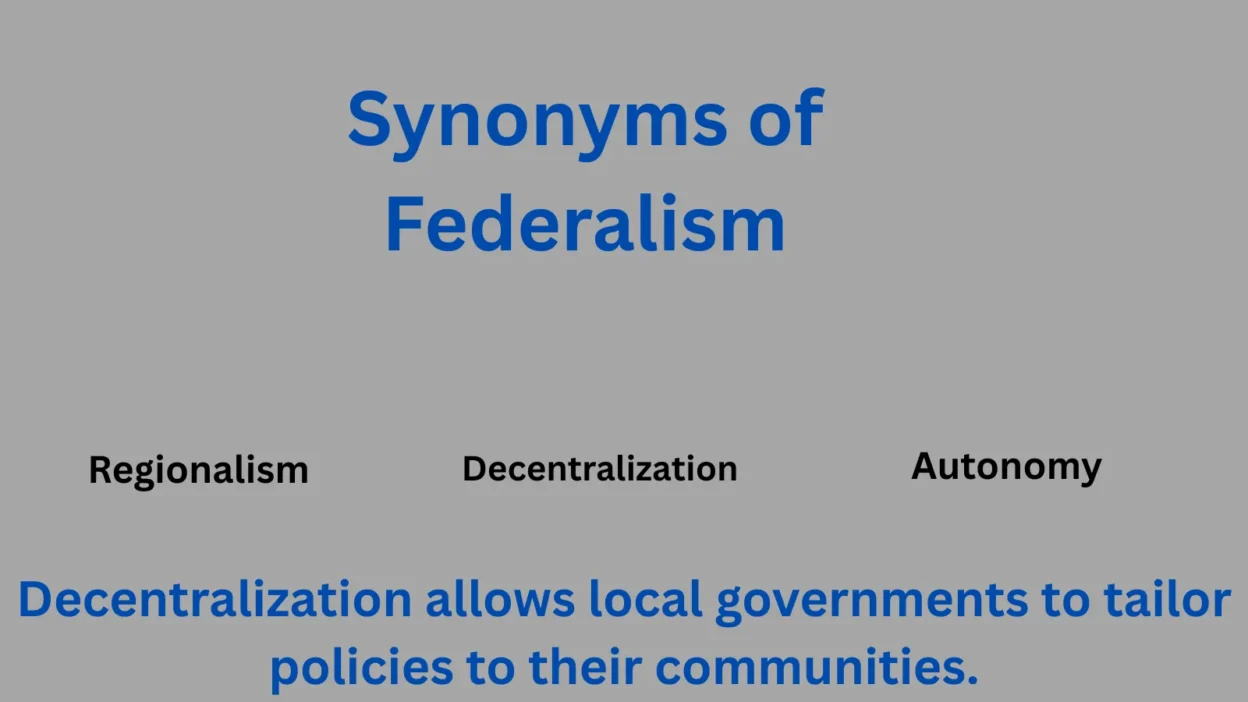Synonyms of Federalism refer to political terms that capture the idea of shared power, autonomy, and decentralized governance. Federalism is a political concept describing a system of government in which power is divided between a central authority and smaller political units, like states or provinces. This division allows different regions to govern themselves while still being part of a larger national framework. Federalism balances unity and diversity, giving local governments autonomy on many issues while maintaining a unified country.
Because federalism is about sharing power and cooperation between levels of government, its synonyms often reflect ideas of decentralization, autonomy, and division of authority, but each federalism synonym has its subtle shade of meaning.
This article explores 30 synonyms and alternatives to federalism, explaining what each means and when to use them. We’ll also give you tips on selecting the right word based on context, tone, and cultural considerations.
What Is Federalism? Key Traits and Nuances
Federalism is characterized by:
- Division of Power: Authority is split between national and regional governments.
- Shared Sovereignty: Both levels have their responsibilities.
- Cooperation and Conflict: Regions can make local decisions, but must cooperate with the federal government.
- Flexibility: It allows for diverse policies suited to local needs within one nation.
Federalism is a balanced and structured system, often seen as a compromise between centralization and independence. It’s formal and institutional, but can vary widely in practice depending on a country’s culture and history.
Synonyms and Alternatives for Federalism
Below are 30 alternatives, each with a brief description, example sentence, and guidance on when to use it.
1. Decentralization
Meaning: Distribution of decision-making power away from a central authority.
Example: “Decentralization allows local governments to tailor policies to their communities.”
Use when: Emphasizing the practical shift of power downward rather than the constitutional setup.
2. Confederation
Meaning: A union of sovereign groups or states with limited central power.
Example: “The confederation of states agreed to cooperate on defense while retaining autonomy.”
Use when: Highlighting a loose alliance where member states keep most power.
3. Autonomy
Meaning: Self-governance or independence within a larger system.
Example: “The region enjoys political autonomy over education and health policies.”
Use when: Focusing on independence or freedom of a subunit.
4. Devolution
Meaning: The transfer of power from the central government to lower levels.
Example: “Devolution of authority empowered the regional councils.”
Use when: Describing the process or act of delegating powers.
5. Intergovernmentalism
Meaning: Cooperation between governments on shared issues.
Example: “Intergovernmentalism is crucial for managing transnational problems.”
Use when: Emphasizing collaboration rather than hierarchy.
6. Subsidiarity
Meaning: Decisions made at the most local level are capable of addressing them.
Example: “The principle of subsidiarity guides policy-making in the EU.”
Use when: Highlighting local problem-solving priority.
7. Federal structure
Meaning: The organizational design of federalism.
Example: “The country’s federal structure divides power.”
Use when: Talking about the setup or framework.
8. Regionalism
Meaning: Focus on the interests of a particular region.
Example: “Regionalism influences political debates over resource control.”
Use when: Emphasizing regional identity or interests.
9. State sovereignty
Meaning: Authority of states to govern themselves.
Example: “State sovereignty is a pillar of the federal system.”
Use when: Discussing legal or political independence of states.
10. Shared sovereignty
Meaning: Power shared between central and regional governments.
Example: “Shared sovereignty allows flexibility in governance.”
Use when: Emphasizing cooperative authority.
11. Union
Meaning: The act or state of being united, especially politically.
Example: “The union of states formed a federal republic.”
Use when: Talking broadly about a combined entity.
12. Bicameralism
Meaning: A two-chamber legislature often reflecting federal principles.
Example: “Bicameralism ensures state representation at the national level.”
Use when: Describing legislative design linked to federalism.
13. Sovereignty sharing
Meaning: Dividing supreme power among entities.
Example: “Sovereignty sharing is central to peaceful federal coexistence.”
Use when: Focusing on the political principle behind federalism.
14. Federation
Meaning: A political entity characterized by federalism.
Example: “The federation grants its states substantial powers.”
Use when: Referring to the country or system itself.
15. Composite state
Meaning: A state made up of multiple distinct entities.
Example: “The composite state manages diverse ethnic groups through federalism.”
Use when: Emphasizing diversity within a unified system.
16. Multi-level governance
Meaning: Different layers of government working simultaneously.
Example: “Multi-level governance complicates policymaking but allows flexibility.”
Use when: Highlighting the complexity of overlapping authorities.
17. Political decentralism
Meaning: The philosophy of distributing political power.
Example: “Political decentralism challenges overly centralized systems.”
Use when: Discussing ideology or advocacy.
18. Home rule
Meaning: Local self-government granted by a central authority.
Example: “The city has home rule to manage its affairs.”
Use when: Describing local autonomy granted by law.
19. Confederalism
Meaning: Similar to confederation, but used more in theory or advocacy.
Example: “Confederalism proposes a weaker central government.”
Use when: Emphasizing political theory.
20. Autarchism
Meaning: Political independence or self-sufficiency.
Example: “Autarchism in regions can clash with national interests.”
Use when: Focusing on self-rule as a principle.
21. Localism
Meaning: Prioritizing local control and interests.
Example: “Localism resists federal mandates in education.”
Use when: Highlighting grassroots or community focus.
22. State rights
Meaning: Rights reserved to individual states rather than the federal government.
Example: “State rights debates often surface in federalism discussions.”
Use when: Talking about the political/legal rights of states.
23. Divided sovereignty
Meaning: Splitting ultimate authority across entities.
Example: “Divided sovereignty helps protect minority interests.”
Use when: Emphasizing the split nature of authority.
24. Shared governance
Meaning: Cooperative management between governments.
Example: “Shared governance requires negotiation and compromise.”
Use when: Describing collaborative administrative roles.
25. Compound state
Meaning: A state with multiple constituent units.
Example: “The compound state model suits culturally diverse nations.”
Use when: Highlighting structure of multi-part states.
26. Dual sovereignty
Meaning: Both national and subnational governments hold sovereignty.
Example: “Dual sovereignty is a hallmark of American federalism.”
Use when: Focusing on constitutional theory.
27. Interstate cooperation
Meaning: Collaboration between states within a federal system.
Example: “Interstate cooperation manages shared resources.”
Use when: Highlighting practical alliances.
28. Decentralized governance
Meaning: Governance is spread across multiple levels.
Example: “Decentralized governance can improve responsiveness.”
Use when: Emphasizing administrative decentralization.
29. Shared authority
Meaning: Joint power held by different government levels.
Example: “Shared authority balances national interests with local needs.”
Use when: Discussing the distribution of power.
30. Federal arrangement
Meaning: The agreed distribution of powers between government levels.
Example: “The federal arrangement defines fiscal responsibilities.”
Use when: Talking about formal political agreements.
How to Choose the Right Synonym for Federalism
- Consider the Tone:
- Use decentralization or localism for practical or policy-focused discussions.
- Use confederation or confederalism when emphasizing loose political unions.
- Use shared sovereignty or dual sovereignty in academic or constitutional contexts.
- Consider the Context:
- When discussing legal rights, use state rights or autonomy.
- For cooperation between governments, use intergovernmentalism or shared governance.
- For describing structural design, use federal structure, compound state, or federation.
- Consider Emotional and Cultural Nuances:
- Localism might carry grassroots or populist connotations, especially in cultural debates.
- Confederation might suggest a weaker union, sometimes perceived as unstable or transitional.
- Federalism itself is often linked with balanced compromise and stability.
- Formal vs. Informal:
- Terms like subsidiarity, bicameralism, and dual sovereignty are more formal or academic.
- Words like home rule or localism might be more common in everyday political discourse.
Conclusion
Federalism is a complex concept with many related terms that highlight different aspects of shared power, autonomy, and cooperation. Choosing the right synonym for federalism depends on your focus—whether on legal authority, political philosophy, practical governance, or cultural identity.
When writing, think about the tone and context. For example, use decentralization to emphasize shifting powers practically, or confederation when describing looser political ties. Understanding these nuances can enrich your writing and help you communicate more precisely.
By familiarizing yourself with these 30 synonyms and their subtle distinctions, you can confidently select the best word for your audience and purpose, making your discussion about federalism clearer, more engaging, and more effective.




